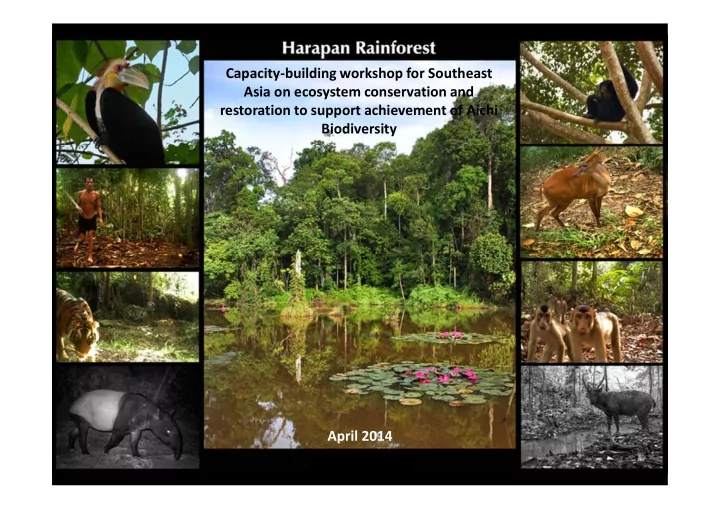

Capacity-building workshop for Southeast Asia on ecosystem conservation and restoration to support achievement of Aichi Biodiversity April 2014
First Ecosystem Restoration concession in Indonesia Concession Area
Why Indonesia and why Sumatra? 16-24 Species density Density map of globally-threatened birds across the world 1 Millennium Ecosystem Assessment (2005) Biodiversity synthesis report
• 1900: 16 million ha • 1997: 2.2 million ha • 2002: 650,000 ha • 2011: 500,000 ha • 2014: ???? ha Harapan Rainforest Concession: 98,555 ha now represents 20%+ of all remaining dry lowland rainforest in Sumatra
Harapan Rainforest Ecosystem Restoration Concession • Status: Production Forest managed for Ecosystem Restoration • License: South Sumatra (52,170 ha): 2007 for 100 years Jambi (46,385 ha): 2010 for 60 + 35 years • Rights to benefit from: Non-Timber Forest Products and environmental services • Not permitted: Timber harvesting, agricultural development and mining
Vision: ‘Restoring Indonesia’s Forests For Future Needs’ Mission: As forest stewards we will: • Protect and restore the productivity and ecosystem services of Indonesia’s natural forest. • Sustainably manage the forest resources in harmony with nature and people’s needs. • Collaborate with diverse partners and demonstrate innovative techniques.
Long-term aims • A viable and healthy ecosystem for Indonesia and the world • Financially self-sustained • A productive landscape in the region, contributing to local economy • Multi-stakeholder participation • Broad base of collaborative supporters
Existing Land Use Plan (2008)
Draft Land Use Plan (2014) LUP Allocation Conservation: 52% Livelihood: 5% Collaboration: 11% Intensive Restore: 2% Wood Production: 25% Shareholder: 3% Infrastructure: 2%
Management activities • Forest protection • Environmental monitoring • Research and Development • Restoration • Community partnership • Business development
Forest Protection Classroom Instruction Self-defense training Fire Management
Forest Fire Management
Environmental monitoring IUCN Protection Status Species Total Species Type Identified CR EN VU NT Birds 305 - 1 8 67 Mammals 64 2 8 9 5 Amphibians 38 - - - 6 Reptiles 57 - 2 - - Fish 122 1 3 - Bees 2 - - - - Vegetation 728 4 6 11 - Total 1,316 7 17 31 78
Monitoring flora, fauna and abiotic systems across the whole forest
Research and Development Forest restoration based on science. Interpolations and modeling of current forest condition. Pioneer proportion of High Basal area Pioneer secondary stem frequency (m 2 ha -1 ) dominated forest Open Climax land dominated
Current research collaborators National • Universitas Jambi • Universitas Bogor (IPB) • Universitas Andalas • FORDA International • University of Copenhagen • University of Gottingen • University of Hamburg • Kew Gardens
Forest Restoration • Planting – Nurseries: producing high value wood, NTFP and biodiversity seedlings for the forest • Assisting natural regeneration – Removing pioneer species and noxious plants which inhibit natural growth – Reducing competition for targeted tree species
Community nursery Central nursery
Community partnership • Bathin sembilan (SAD) • Approximately 200 families
Sekola bersamo Klinik bersamo
Planting day with students from local schools
Business development • Becoming self- financing • High value NTFPs – Honey – Bamboo – Rattan – Rubber – Jelutung – Jernang – Gaharu • Carbon crediting • Eco-tourism
Collaborating with community businesses – rubber extraction
Challenges to ERC Sustainability 2002 1980’s 2008 2013
Forest Access 2002 1980’s June 2013
Harapan Base Camp, Jambi Province, Sumatra
Partners: Donors:
Recommend
More recommend